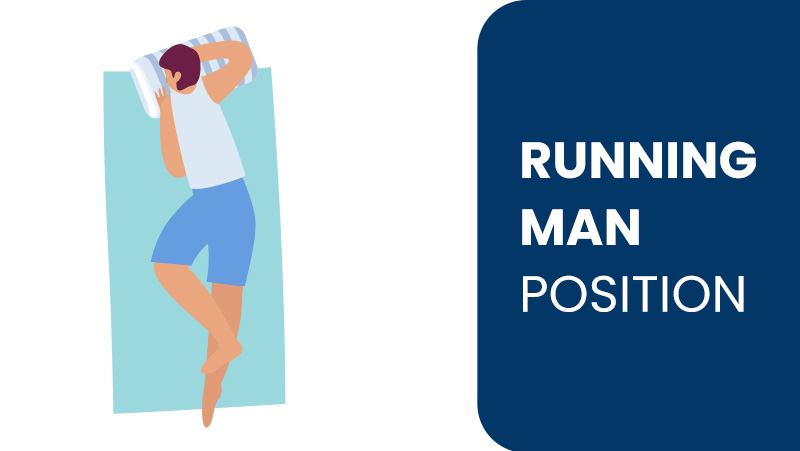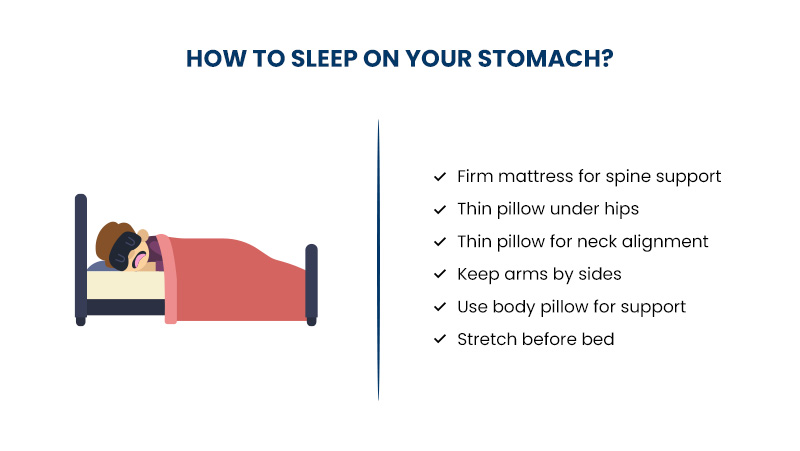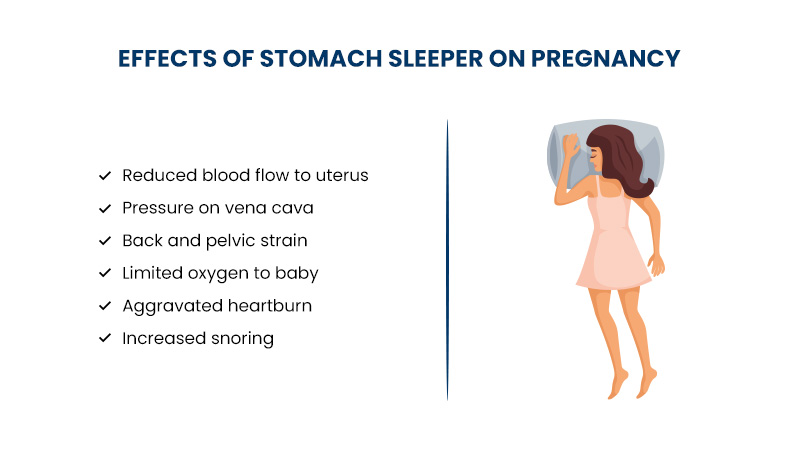16% of adults prefer to sleep on their stomachs. That's not a lot, but if you are one of them, you can spare a few minutes here. Although stomach sleeping is not the most common position among individuals, it seems highly cozy.
There is no doubt that stomach sleeping has more downsides than benefits. We’ll discuss each of them, along with their characteristics, stomach sleepers' issues while sleeping, tips to sleep safely on your tummy, and ways to switch up your sleeping position. Keep reading to learn more!
Is Stomach Sleeping Good or Bad?
If you’re someone who enjoys sleeping on their stomach, you need to know that you will not be immune to specific adverse effects that it may have on your health. Although tummy sleeping is comfy and not bad, the majority prevails, right?
| PROS | CONS |
|---|---|
| Reduces snoring | Causes chronic neck issues |
| Decreases sleep apnea symptoms | Puts a lot of pressure on your back |
| Alleviates acid reflux | Increases risk of wrinkles |
| Pressure on organs | |
| Causes stiffness | |
| Worsens existing joint pain | |
| Disturbs breathing cycle |
Sleeping on your stomach is not the best posture for your spine and neck, even though some changes might help stomach sleepers feel better. The risk of soreness and strain on your muscles and joints always remains. Because your head remains turned to one side for prolonged periods, it may further aggravate neck discomfort.
Types of Stomach Sleeping Positions
The term "prone position" also refers to lying on one's stomach when sleeping. This occurs when a person lies flat on their chest, touching the mattress with their entire body. While stomach sleeping is not necessarily negative—for example, it can be helpful for people with severe snoring problems and obstructive sleep apnea—it may not be the best choice for others.
Everyone knows having a good night's sleep is essential to overall health. But is every sleeping position beneficial? Lying on your stomach is usually considered one of the worst choices. Let's look at these common stomach sleeping postures and how they affect our health.
1. Freefall position
Many stomach sleepers may relate to the Freefall position, which involves putting their arms over their pillow and tilting their heads to one side. However, this position may strain and hurt your neck. Try resting your head on a thin pillow or nothing at all to improve this position. This will encourage a more neutral spine and keep your neck from bending too much.

2. Running Man Position
The infamous running man position involves sleeping with one arm at your side and another up in a running stance. In this position, it's almost necessary to maintain straight legs and hips. To prevent twisting your head to one side, rest your forehead on a pillow and keep it down until there is no more pain in the neck and spine. It might be funny when you start, but you eventually get accustomed to this posture and see how effective it is for you.

3. Skydiver Position
The skydiver position is when you sleep with one leg raised and position the arms by the head. Although it may look cozy, this particular one can strain your neck and spine. To avoid this, keep your leg down at all times and lay a tiny pillow under your pelvis to adjust this posture. Doing this may protect your spine from twisting and maintain a more neutral posture.

Healthy Tips to Sleep on Your Stomach
Many people find sleeping on their stomachs a problem. However, with the following healthy ideas, you can comfortably and restfully do it. Here are some tips to help you sleep on your stomach:
1. Use a flat pillow
A supportive pillow is essential for sleeping in all directions, but it becomes more necessary if one sleeps on one's stomach. Your pillow should be firm and flat so your neck and head remain aligned with your spine.
Your pillow should be firm and flat so your neck and head remain aligned with your spine. The perfect choice for your stomach sleeper pillow will depend on this. An overly thick pillow can stretch out your muscles so much that it causes pain in the neck, which will prevent you from sleeping at all because of its height.
Consider purchasing a total-body one or a slim and flat one whose size enables those lying down on their belly to sleep comfortably without fear of suffocation.
2. Use a thin mattress
A firm and thin mattress will provide the appropriate support for back sleepers. To prevent pressure from the back and neck, a mattress needs to be plush but not too soft and one in which you will not sink your body. If buying a new mattress now is impossible, you can add some new support by putting a thin board or piece of plywood under it.
3. Stretch before You Sleep
You can stretch before sleeping to prepare your body and muscles for sleep. But if you're a stomach sleeper, stretch your neck, back, and hips well to loosen the day's built-up tension properly. Some stretches you can do include cat-cow, child's pose, and cobra pose.
4. Avoid using a thick comforter
A thick and heavy comforter may hamper easy breathing against your stomach as you sleep, causing restlessness and irritation due to increased perspiration. Choose a thinner blanket or sheets that are porous enough not to interfere with airflow, which will resolve matters.
5. Use a knee pillow
Keeping the spine aligned is possible by placing a pillow between the knees in case one shifts or rotates while sleeping. This simple action helps remove tension that could build up quickly on the back and hips, and sleep becomes comfortable and restful.
For people who have undergone knee replacement surgery and are habitual or sleeping on their bellies, stomach sleeping pillows can do wonders in supporting your knee post-surgery while sleeping.
6. Avoid sleeping with your head turned to one side
It is common for people who sleep on one side to wake up stiff and with neck pain. To maintain the neck in alignment, it is best if the head faces downward towards the pillow. If you tend to move your head around during sleep, a neck support pillow or a small pillow beneath the chin helps avoid unwanted movement.

Is it Safe to Sleep on Your Stomach During Pregnancy?
Understanding the physical changes pregnant women experience is the primary concern. The center of gravity shifts, and the abdomen gets heavier because of the growing baby inside and an enlarging uterus. This makes it difficult to sleep on the stomach with a different weight distribution.
There may not be much difference in how you sleep during the first three months of pregnancy, but if you are so sore, it might deprive you of a good night's sleep. This could eventually lead to insomnia, which can be disastrous for both you and your baby.
One of the risks of preterm birth is sleep deprivation while pregnant. This is because lack of sleep causes an increase in the stress hormone, which may lead to early labor; additionally, it can also prolong the labor hours and raise labor pains, making your birthing experience more arduous.
Health professionals recommend that pregnant mothers sleep on the left-hand side. This position ensures the body supplies blood well to both you and your baby. With this, there will be minimal straining on the liver and vena cava.
It also relieves foot, ankle, and leg swelling— otherwise called edema. More than that, since acid reflux happens to most (if not all) expectant mothers, sleeping on the left side can also relieve the pain to help you digest better.
A pregnancy body pillow for a stomach sleeper would help support your belly and cushion your legs more comfortably. At the same time, you sleep on your side, relieving some of this discomfort and providing further support for your growing belly.

What is the Best Pillow for Stomach Sleepers?
When choosing the best pillow for stomach sleepers, its objective should be to give soft and aligned support for the head and neck. The following are some key things to consider in the selection process:
1. Thin Pillows
However, if you are a stomach sleeper, a pillow with a low loft and low thickness is best for you. A giant pillow will only incline your head forward and could strain your neck. Look for a pillow with a modest two—to three-inch loft to help keep your neck in a neutral and comfortable position.
2. Medium Firmness
Soft or medium-firm pillows are recommended for those who find facing down the most comfortable way of sleeping. A firm pillow will give an unpleasant angle to the neck because the head will not slide well. On the other hand, the head remains in its place if you use a softer one while providing adequate support so that one feels comfortable around the neck and the spine.
3. Body Size
The other important consideration is your body size. If you have a smaller frame or are petite and simply love sleeping on your tummy, a thinner belly sleeper pillow will benefit you. Such a pillow will keep the head from rising too high. On the other hand, a more significant pillow will require a slightly thicker pillow to ensure proper support.
4. Material
These types of pillows are essential for those who prefer sleeping on their belly. Materials like memory foam or down can be too firm or thick for stomach sleepers, so it's better to opt for those that contain crushed memory foam or pony up for quality synthetic down pillows.
5. Adjustable Pillows
If you can't find the perfect pillow, consider an adjustable pillow. These pillows can be adjusted in firmness and height by adding/reducing stuffing, which might better suit you—especially if you are a stomach sleeper and must try several types.
6. Breathability
Breathability: You may want to sleep warm, so a pillow with good breathability is crucial. The best material for such cases would be latex or buckwheat, which enhances air circulation so that you remain relaxed and comfortable at night.
How to Prevent Yourself from Sleeping on Your Stomach?
- Place pillows under your knees or between your legs for extra comfort.
- Choose a firmer mattress to make your stomach sleeping less comfortable.
- Keep conscious all through the day to avoid sleeping on your stomach.
- Train yourself to sleep on your side or back as much as possible with appropriate positioning.
- Think about using a body pillow to help you keep your preferred sleeping position.
- If you wake up on your stomach, move gently to another position.
When to Seek Medical Care?
Suppose you wake in the morning with persistent pain in your back or neck, either an ache or muscular numbness in your limbs, tingling while sleeping, or even the sensation of suffocation. In that case, these may prove telling indications that you prefer to sleep on your stomach.
It is no longer an issue of personal comfort; there are chronic possible issues at stake. Look out for symptoms like indigestion, heartburn, and acid reflux, which could be subtle but very urgent calls for professional assessment.
In addition, the existence of comorbidities presenting before a case like sleep apnea or GERD makes the need for medical attention a priority since no concern of change in posture, distortion in spine alignment, skin irritation, or pressure sores is trivial.












